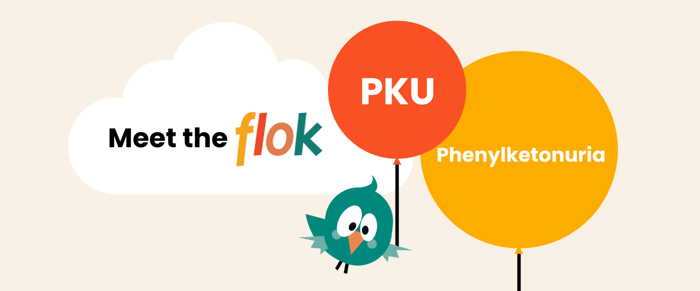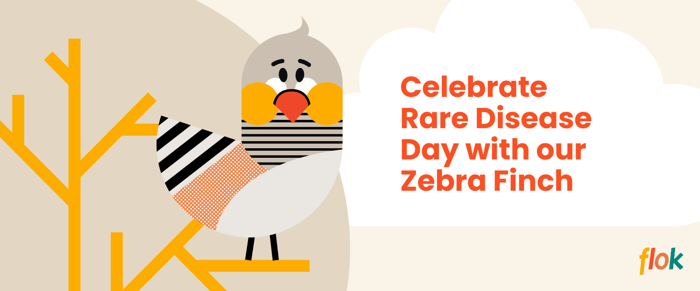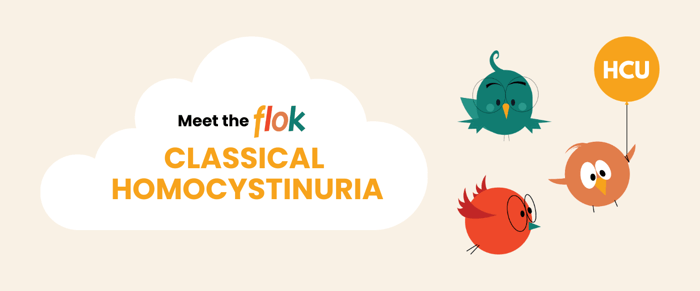Our “Meet the flok” series profiles the inherited conditions of protein metabolism that make up our diverse community: Classical Homocystinuria, Maple Syrup Urine Disease, Organic Acidemias, Phenylketonuria, Tyrosinemia, and Urea Cycle Disorders. Each article highlights personal stories of resilience and the efforts of advocacy leaders to support individuals facing each condition. We hope this series will educate, inspire, and unite our flok community in a shared mission to improve treatment for our rare conditions.
FAST FACTS: PHENYLKETONURIA |
| Cause The body cannot convert the amino acid phenylalanine into tyrosine, which results in a toxic buildup in the blood |
| Prevalence ~17,500 in the United States |
| Incidence 1 in every 15,000 births |
| Presenting Symptoms |
| developmental and intellectual delay, mood dysregulation, sleep disturbance, seizures |
| Treatment A low-protein diet and phenylalanine-free formula. Some people are responsive to medications that increase the amount of protein the body can metabolize |
| Source: National Library of Medicine |
Ellie & Zay Austerman
Adolescent Life with PKU
As Ellie and Zay share their experience growing up with phenylketonuria (PKU), they radiate a level of maturity and insight atypical of most middle-schoolers. Fourteen-year-old Zay shares, “You look up PKU online and you see people with developmental disabilities, and parents that aren’t able to afford the care for kids. You realize this is a big deal.”
When Zay was born in 2009, his Newborn Screening revealed both congenital hypothyroidism and a diagnosis of PKU. In 2012, his younger sister Ellie also tested positive for PKU. This inherited metabolic condition limits the body’s ability to break down phenylalanine- an amino acid in protein. Treatment involves a lifelong low-protein diet, medical formula, and, for some, medication. Without intervention, children born with PKU experience profound physical and developmental delay. Ellie & Zay’s parents Shane and Jackee express gratitude for the Newborn Screening, which allowed them to start immediate treatment and enable their kids to grow and develop normally.
Now fifth and eighth graders, Ellie and Zay are flourishing in school, sports, and extra-curriculars. Zay plays basketball, soccer, cross country and enjoys math, band, choir and video games. Ellie participates in volleyball, basketball, soccer, piano and is pursuing a babysitter certification. Though healthy and thriving, the siblings recognize the daily hurdles of their strict medical diet. At school they eat a meal prepared by the kitchen staff using low-protein products ordered from Cambrooke, they drink medical formula throughout the day, and pack low-protein food for after-school sports and activities. Both Ellie and Zay take Kuvan – a daily drug that increases the amount of protein their body can tolerate from food. Even with Kuvan, most grocery store and restaurant items exceed their allowable protein amount, making spontaneous meals very difficult.
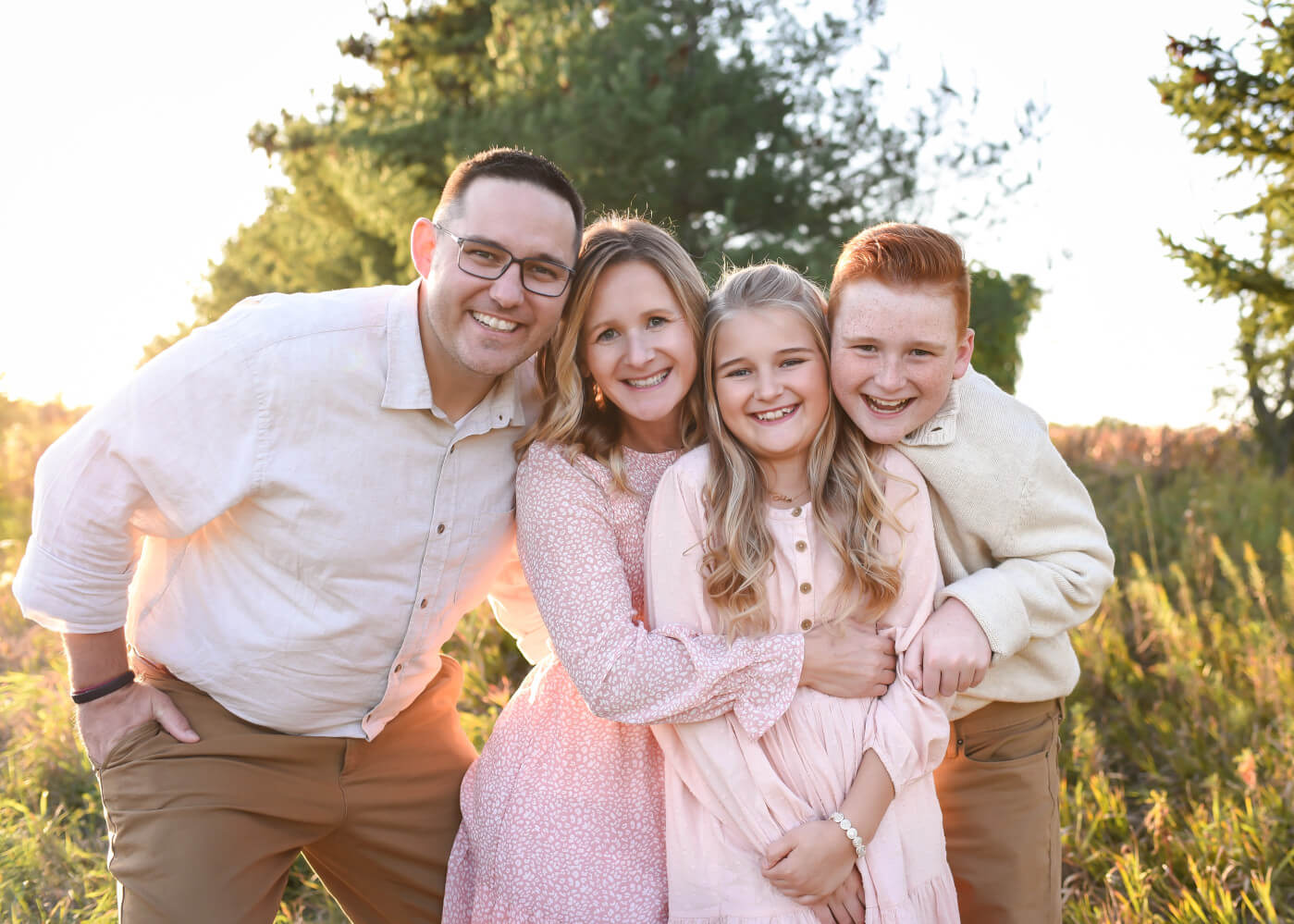 Young Advocates
Young Advocates
The siblings take blood samples every two weeks to ensure their phenylalanine levels are within range. They note that elevated levels can make them feel more emotional. While these dietary considerations are a daily part of life for the siblings, they identify the silver linings of living with PKU. Eleven-year-old Ellie shares, “Although it’s not always fun, it shapes who I am. I’m disciplined and more understanding of others who are different.” Zay jokes that while it can feel repetitive explaining PKU to others, “It’s fun to see people’s reactions when I say phenylketonuria fluently.”
Both Ellie and Zay display humor, compassion, and a drive to support others living with PKU. Every year they speak to medical students at the University of Iowa with their parents to spread awareness and share their personal experience. They express hope for improved treatment options for PKU in the future, and one day a cure.
Jackee & Shane Austerman
PKU Parents & Advocates
Championing Insurance Coverage for PKU Treatment
When Jackee and Shane received their children’s PKU diagnoses, they identified some of the systemic barriers to accessing care and sprung to action. Shane explains, “When you get a diagnosis, there are many aspects to it– the medical, the social, the policy and the politics that go along with it, and the insurance side. Navigating insurance is one of the things that people are most overwhelmed by.” To address the issue, he started offering individualized support and education on insurance coverage for people across the country caring for or living with an inherited metabolic condition – many of whom face barriers to medication and medical food coverage.
Jackee and Shane’s advocacy efforts also extend to the political realm, where they have lobbied for the Medical Nutrition Equity Act (MNEA) since 2009 – the same year Zay was born. The bill, currently H.R. 6892, sets a federal floor for insurance coverage of medical foods for individuals born with inherited conditions of metabolism and certain digestive conditions. Many people struggle to afford the high cost of formula and low-protein foods that the treatment requires. The bill would fill a critical gap in medical access for the PKU community, as Shane states plainly, “Brain damage is not a choice or option for people.”
The Austermans demonstrate a fierce commitment to spreading PKU awareness and advancing the Medical Nutrition Equity Act in their home state of Iowa. They played key roles in clinching Iowa Senator Chuck Grassley as the first Republican co-sponsor and lead, and later gained Senator Joni Ernst’s support for MNEA, which contributed to its bipartisan momentum. In addition to their lobbying efforts, Shane and Jackee successfully fought for state funding for Iowa families to receive an annual stipend to support the high cost of care for PKU drugs and medical food.
Community Call to Action
Shane and Jackee emphasize the importance of the broader metabolic community openly sharing their personal experiences to help others; they see hiding the struggles as a missed opportunity to raise awareness. Jackee states, “Everyone has power to influence in their community circle. Share your story, because it’s the only way that people understand the challenges and can drive change.”
Part of this change includes advancing our understanding of PKU and related conditions. Both parents express enthusiasm for the flok app that will allow Zay and Ellie to track their diet, mood, symptoms, and blood levels to better understand how they influence one another. Both parents are optimistic these new insights will accelerate new research for treatments– “it will advance the science so much farther than where it’s at now.”
Maridith Baker
Young Adulthood with PKU
 Sporting a tattoo of phenylalanine’s chemical structure on her forearm, Maridith proudly shares her experience growing up with PKU – “I never hid it, and I never let it hold me back from anything.” Maridith received her diagnosis at 10 days old from the Newborn Screening, and immediately began treatment with a low-protein diet and medical formula. She recalls taking charge of her condition management early on, even pricking her own finger for blood spots at age seven. Maridith also approached her diet with curiosity, taking an active role in grocery shopping, meal planning, and mixing formula.
Sporting a tattoo of phenylalanine’s chemical structure on her forearm, Maridith proudly shares her experience growing up with PKU – “I never hid it, and I never let it hold me back from anything.” Maridith received her diagnosis at 10 days old from the Newborn Screening, and immediately began treatment with a low-protein diet and medical formula. She recalls taking charge of her condition management early on, even pricking her own finger for blood spots at age seven. Maridith also approached her diet with curiosity, taking an active role in grocery shopping, meal planning, and mixing formula.
Her mother empowered her to openly discuss her condition with friends at school. She received an individualized education plan and 504 for accommodations with test-taking, which helped her succeed academically. Maridith encourages others with PKU to never feel ashamed of the condition, be vocal and ask for help where it’s needed.
Maridith went on to attend the University of Central Florida and served as a psychology teaching assistant, lecturing a 350-person class on PKU and its impact on the brain. She shares that living with PKU helped foster her public-speaking skills and build personal confidence, “It has given me so many opportunities.”
Rallying the PKU Community through Social Media
Social connection plays an important role in Maridith’s life with PKU: she began attending conferences and camps at age nine, finding comfort and strength in shared experience with peers. She continued attending PKU-related events into her early adulthood across seven states but long wanted to create more local opportunities. She helped build the Central Florida PKU Facebook group and planned a Dole Whip ice cream social at the Disney Mall in October 2023. To her surprise, over 100 individuals with PKU and their families attended, with some attendees flying in from Canada and Georgia. Following the event, Maridith teamed up with representatives at Biomarin Pharmaceutical and Nexus Medical Nutrition to coordinate and fund subsequent events, including a meet-up for PKU Awareness Day in December of 2023.
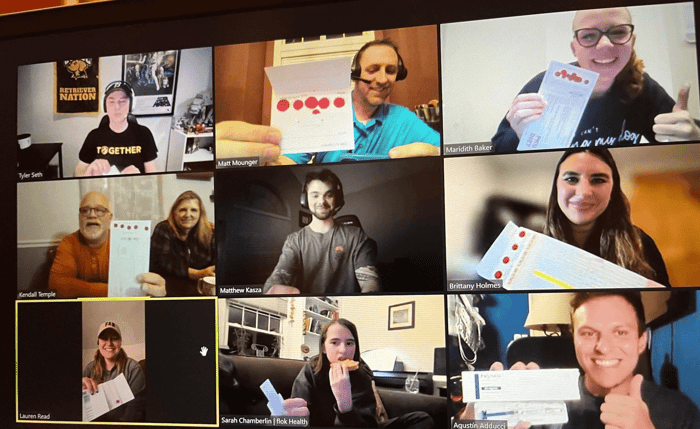 Maridith’s current advocacy efforts include “Phe Level Friday” – a virtual campaign to support anyone with PKU seeking comradery while performing the at-home phenylalanine blood spot. “Phe Level Friday” developed out of close friendships Maridith forged with five other individuals with PKU at a conference two years ago. The friends texted daily and decided to all check their blood levels on the same day in solidarity. They posted photos on social media with the hashtag “#phelevelfriday” and received national engagement from the PKU community. In February 2024 the group hosted their first live Phe Level Friday zoom event, and plan to continue. Maridith hopes the virtual events will unify, support, and encourage others to complete their routine blood spots, which are crucial to condition management.
Maridith’s current advocacy efforts include “Phe Level Friday” – a virtual campaign to support anyone with PKU seeking comradery while performing the at-home phenylalanine blood spot. “Phe Level Friday” developed out of close friendships Maridith forged with five other individuals with PKU at a conference two years ago. The friends texted daily and decided to all check their blood levels on the same day in solidarity. They posted photos on social media with the hashtag “#phelevelfriday” and received national engagement from the PKU community. In February 2024 the group hosted their first live Phe Level Friday zoom event, and plan to continue. Maridith hopes the virtual events will unify, support, and encourage others to complete their routine blood spots, which are crucial to condition management.
The Future
Maridith expresses the need for more PKU research and treatment options in the future. She shares that her own discovery process is ongoing, as she continues to learn about a range of factors that impact her phenylalanine levels and symptoms. With the advent of flok’s data platform, she is optimistic for a greater understanding of the condition and its variability among people – “Everyone’s journey is so different.”
In spring of 2023 Maridith graduated from the University of Central Florida with a bachelor’s degree in psychology and a minor in sociology. She recently launched her professional career as a Project Manager at the PKU Hope Foundation where she will continue to inspire and mobilize the PKU community.
Dianne Obert
Adulthood with PKU
Navigating a Misunderstood Diagnosis
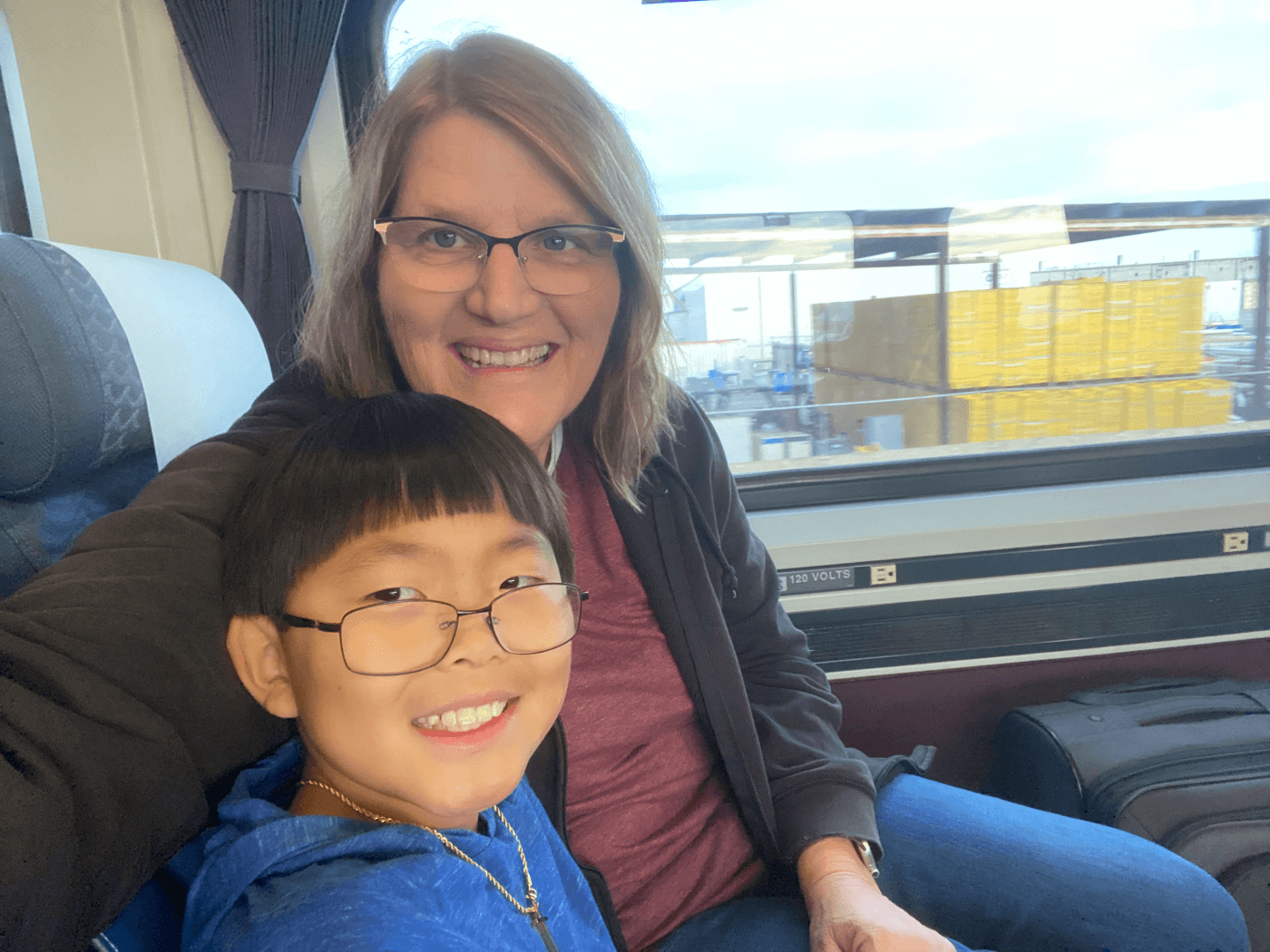 Dianne, a middle-school special education teacher and mother of three, lives a healthy and successful life as an adult managing PKU – after a 13-year treatment gap in adolescence. She grew up in a time when the medical community understood little about her rare metabolic condition, and recommendations for daily management varied drastically from today’s standards. Dianne was born in 1965, only a few months before the Newborn Screening for PKU took effect in California. Thankfully, the San Diego hospital where she was born pioneered early testing and caught her diagnosis at birth.
Dianne, a middle-school special education teacher and mother of three, lives a healthy and successful life as an adult managing PKU – after a 13-year treatment gap in adolescence. She grew up in a time when the medical community understood little about her rare metabolic condition, and recommendations for daily management varied drastically from today’s standards. Dianne was born in 1965, only a few months before the Newborn Screening for PKU took effect in California. Thankfully, the San Diego hospital where she was born pioneered early testing and caught her diagnosis at birth.
Dianne had a supportive family that helped her stick to a low-protein diet. In an era of limited food options, she recalls eating the same staples every day: fruits, vegetables, a jelly and butter sandwich, and medical formula. Then in the early 1970s, a school of thought emerged that people born with PKU could start a regular diet in early childhood because the brain had fully developed. Following this now-debunked medical recommendation, Dianne went off the low-protein diet at age eight, eating everything her family cooked including meat, eggs, and dairy. She experienced frequent headaches and difficulty in certain school subjects. Her clinicians dismissed her symptoms and to her they were unrelated to her dietary changes.
Motivated to learn more about her condition, Dianne found a book on PKU and started reading. She then attended a maternal PKU camp sponsored by the California’s state health department and connected with other young women also off the PKU diet; interestingly, they were all blondes. Dianne learned that when phenylalanine builds up in the body’s system, it affects melanin production causing lightened hair. In addition to providing education about PKU, the camp offered cooking lessons and a variety of phenylalanine-free formulas to sample. Several dietitians were present and encouraged Dianne to resume a protein-restricted diet and medical formula. The education and medical support were all Dianne needed, and she has followed the diet ever since.
With proper nutrition, Dianne’s headaches went away, and her academic performance soared. She graduated from Fresno State with a degree in child development and later earned a graduate degree in special education. Dianne has spent the last 27 years supporting children with learning disabilities and currently teaches in a middle school Resource Specialist Program. Reflecting on her experience growing up with PKU, Dianne states, “What’s hard is also a blessing. You become a very strong person.”
Raising a Child with PKU
Dianne adopted three children from China, and her youngest son Noah was diagnosed with PKU at a young age. Dianne shares that while he received medical formula and low-protein food at the orphanage in Nanjing, it’s unknown how closely they followed his diet; access to medical food is limited in China and very few providers specialize in PKU management.
Dianne raised Noah in California with the appropriate medical and dietary support, and with the wisdom of someone who has PKU herself. Now nine-years-old, Noah is a thriving third grader who loves to cook – even making scrambled eggs for his older brother. Dianne encourages all three of her children to experiment with recipes, whether they are “regular” high protein meals or PKU-friendly items. She recognizes the importance of learning recipes to meet everyone’s nutritional needs in the context of socializing and supporting relationships. She states, “Noah is very active in the kitchen. He loves to season different soups!”
Dianne hopes for continued research and innovation to support daily life with PKU, including treatments that liberalize the diet to allow more convenience and flexibility with food selection. She expresses the need for a home phenylalanine monitor to help people understand whether certain physical symptoms are a sign of high or low levels in the blood. Dianne believes that a home monitor coupled with information about diet, mood, and exercise collected in the flok app could be “lifechanging for PKU.” Despite the challenges posed by her condition, Dianne feels grateful for the perspective it has given her and remains optimistic for a future with enhanced treatment options for Noah, and all people living with PKU.
